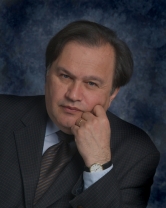
Mark I. Greene, MD, PhD, FRCP
John W. Eckman Professor of Medical Science Emeritus
Perelman School of Medicine at the University of Pennsylvania
Contact Information252 John Morgan Building
3620 Hamilton Walk
Philadelphia, PA 19104
Office: 215-898-2847
Fax: 215-898-2401
Email: GREENE@REO.MED.UPENN.EDU
Specialty Division
Cancer and Immunobiology
Research Expertise
Research Interests:
Receptor function, small molecules, centrosome and associated proteins.
Key words: Receptors, cancer, structure.
Description of Research:
Dr. Greene's research is concerned with defining the principles of receptor function. An area he has concentrated on for the last 19 years involves members of the erbB gene family. Greene's laboratory discovered that pl85c-neu could associate with EGFR to form a heteromeric assembly. This heteromeric complex possessed unique properties including increased kinase activity. The heterodimers had a higher affinity for EGF than homomeric forms of the EGFR receptor and were found to represent the major signaling receptor form. Heteromer formation was found to be preferred over homomeric assembly and the ectodomains were found essential in stabilizing the dimeric species.
Greene's laboratory developed an approach to target and down-modulate oncoproteins which when expressed were critical for abnormal growth. This simple approach developed in the neu system involved developing monoclonal antibodies specific for the ectodomain of pl85. The approach was to take advantage of the formation of kinase active homomeric (pl85-pl85) or heteromeric (pl85c-neu-EGFr) assemblies found on malignant cells and which were active in mediating the transformed phenotype. Normal receptor species which are not activated are in a kinase inactive configuration. Furthermore, down modulation of normal receptors is not associated with cell injury. This was the basis for targeted therapy and the approach has led to an improved treatment for advanced breast cancer.
Greene has recently begun to design organic molecules that disable protein function. His laboratory uses crystallography and thermodynamic analyses to help define cavities near active sites that are used to lodge organic molecules. These cavity filling molecules induce allosteric changes in the active sites leading to modification of protein function.
As part of the studies to define the progression of the transformed phenotype, Greene's laboratory has focused on the assembly and function of the mammalian centrosome. His group has identified several new genes that encode centrosomal proteins that appear relevant to the centrosome assembly pathway. Certain of these genes are also relevant to the spindle checkpoint.
Itmat Expertise
Dr. Greene's research focuses on the design and synthesis of receptor-based therapeutics.
Graduate Groups
Cell and Molecular Biology
Immunology
Education
University of Manitoba, Canada, 1968
M.D. University of Manitoba, Canada, 1972
(Intern), Health Sciences Centre, Winnipeg, Canada, 1973
F.R.C.P (Internal Medicine), Fellow of the Royal College of Physicians (Canada), 1976
(Resident), Health Sciences Centre, Winnipeg, Canada, 1976
Ph.D. (Immunology), University of Manitoba, Canada, 1977
Specialty Certification
FRCP Internal Medicine and Oncology, 1977
Postgraduate Training
Medical Research Council Fellowship, (MRC) Canada, 1973-1975
Research Fellow in Pathology, Harvard Medical School, Boston, Massachusetts, 1976-1977
Medical Research Council Fellowship, Boston, 1976-1978
Awards and Honors
Sir Sam Steele Memorial Scholarship, 1966
Actuarial Award, 1966
Memorial Scholarship, 1966
Mathematic Association Prize, 1966
University of Manitoba Scholastic Award, 1966
Medical Research Council Fellowship Award, 1973-1978
American Cancer Society Faculty Award, 1982
American Society for Clinical Investigation, 1985
Focused Giving Award, Johnson & Johnson, 1985-1987
Lotte Strauss Award, 1986
Trustee: Leukemia Society of America, 1988-1990
John Eckman Professor of Medical Sciences, 1989
Councilor-American Society for Clinical Investigation, 1989
American Cancer Society Annual Scientific Award, 1991-1992
John Guggenheim Fellow, 1991-1992
Human Frontiers Award, 1993-1996
Bride's Magazine: Cancer Research Award, 1994
Dean's Award, 1994
Interurban Clinical Club, 1995
American Association of Physicians, 1996
Capcure Award, 1996
Stanley N. Cohen Biomedical Research Award, 1998
Abramson Family Cancer Research Award, 1998
Newton Abraham Professor-Oxford University 2002-2003, 1999
Ashmolean Society, 2002
Master of Arts (Honorary), Oxford University, 2003
Allyn Taylor Prize in International Medicine, 2006
BCRF Breast Cancer Research award, 2007
BCRF Breast Cancer Research Award, 2007
Adams County Breast Cancer Research Award, 2007
Cotlove Award, 2008
Dsc. Honoris causa, University of Manitoba, 2009
Trustee Lincoln College and the Dunn School Oxford University, 2010-non
Guerin Chair, Cedars Sinai, 2010
Memberships and Professional Organizations
Web Links
Immunology graduate group faculty webpage.
Pharmacological Sciences graduate group faculty webpage.


